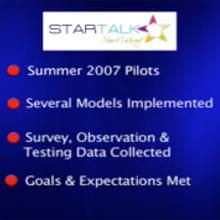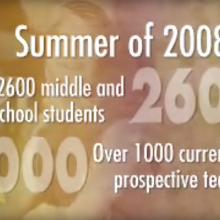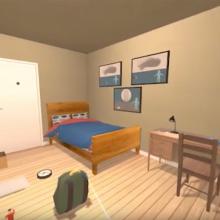Since its founding in 1986, the NFLC has been at the center of national language policy and resource development. Even before the NFLC was created, thought leaders such Richard Lambert, Richard Brecht, and A. Ronald Walton were influencing how policy makers were viewing language as an important facet of our complicated world.
1980: Richard Lambert edits “New Directions in International Education”

Richard Lambert is editor of a special issue of The Annals of the American Academy of Political and Social Science entitled “New Directions in International Education.”
1980: The Tongue-Tied American appears

“The Tongue-Tied American:Confronting the Foreign Language Crisis”, written by Rep. Paul Simon, galvanizes American educators by presenting “a convincing case for strengthening our national security as well as our economy by eliminating our linguistic wasteland.” [Publisher’s Weekly.]
1986: Points of Leverage appears

Points of Leverage: An Agenda for a National Foundation for International Studies is published by Richard Lambert. This publication presented the argument for establishing the NFLC.
July 1986: NFLC established

The NFLC is established at the School for Advanced International Studies of Johns Hopkins University, with Richard Lambert as its founding director.
1987: Institute Of Advanced Studies and Mellon Fellows program established

The NFLC’s Institute of Advanced Studies is established, made possible by an Andrew W. Mellon Foundation grant to support research to improve the teaching of foreign languages.
March 1987: Cultural Literacy appears

Cultural Literacy by E. D. Hirsch is published as an attempt to specify core knowledge for educated American citizens. The book stimulates controversy but sets off an energetic rethinking of language and area studies training for State Department foreign service officers.
June 1987: Foreign Language Instruction: A National Agenda
Richard Lambert is editor of a special issue of The Annals of the American Academy of Political and Social Science entitled “Foreign Language Instruction:A National Agenda.”
March 1990: NCOLCTL established

The National Council of Organizations of Less Commonly Taught Languages is established under the auspices of the NFLC with support from the Ford Foundation.
June 1990: “Foreign Language in the Workplace” appears
Richard Lambert and Sarah J. Moore edit a special issue of The Annals of the American Academy of Political and Social Science entitled “Foreign Language in the Workplace.”
1992: “Foreign Language Planning in the United States” published

“Foreign Language Planning in the United States,” an NFLC occasional paper, is published by Richard Lambert, arguing for more centralized policy-making decisions in US language education.
June 1992: Expanding the Vision of Foreign Language Education
“Expanding the Vision of Foreign Language Education:Enter the Less Commonly Taught Languages,” an NFLC occasional paper, is published by A. Ronald Walton to advocate a broadened focus for world language education in the United States.
1993: Discussion forum hosted
The NFLC hosts a discussion forum to address foreign language planning and to examine how the United States can meet the growing requirements in this area. This forum resulted in an op-ed piece in the Washington Post, “Scaling the Language Barrier.”
June 1993: "National Strategic Planning in the Less Commonly Taught Languages" published
“National Strategic Planning in the Less Commonly Taught Languages,” an NFLC occasional paper, is published by Richard Brecht and A. Ronald Walton calling for a shift away from the almost exclusive focus on Western European languages in the nation’s schools to a new policy emphasizing the development of substantive capacity in less commonly taught languages.
1994: Language Planning around the World published

Language Planning around the World:Contexts and Systemic Change is published by the NFLC. Richard Lambert is the editor.
March 1994: Richard Lambert edits “Foreign Language Policy:An Agenda for Change”
Richard Lambert is special editor of Vol. 532 of The Annals of the American Academy of Political and Social Science on “Foreign Language Policy:An Agenda for Change.”
June 1994: Mellon Adjunct Fellows program established
The Mellon Adjunct Fellows program is established by the NFLC. Former Mellon fellows extend their relationship with the NFLC by working on NFLC activities.
1996: Standards for Foreign Language Learning published

The American Council on the Teaching of Foreign Languages coordinates the development and publication of the first edition of the Standards for Foreign Language Learning:Preparing for the 21st Century.
June 1996: Language Mission Project funded

The Language Mission Project is funded by the Henry Luce Foundation to reevaluate the objectives and practices of language teaching and learning at the undergraduate level.
1997: EELIAS funded
The Evaluation of Exchange, Language, and International Area Studies is funded by the US Department of Education, leading to the development of a web-based data reporting and tracking system for Title VI grantees.
1999: Content-Based Instruction:Defining Terms, Making Decisions published

Content-Based Instruction:Defining Terms, Making Decisions, is published by Myriam Met in an NFLC report on advances in K–12 language education.
1999: LangSource funded

The LangSource project is funded by the US Department of Education’s Fund for the Improvement of Postsecondary Education. LangSource is a searchable, annotated bibliographic database of language and culture resources.
2000: NFLC joins the University of Maryland

The NFLC affiliates with the University of Maryland and moves its offices to College Park, MD.
June 2000: Language and National Security in the 21st Century published

The monograph Language and National Security in the 21st Century: The Role of Title VI/Fulbright-Hays in Supporting National Language Capacity is published by Richard Brecht and William Rivers. The publication is supported by a Department of Education grant.
2001: LangNet initiated

The LangNet program is developed by the NFLC as part of a federal interagency initiative. LangNet is a state-of-the-art online foreign language learning and maintenance system for advanced language learners.
March 2001: Language and National Security published
Language and National Security: The Federal Role in Building Language Capacity in the U.S. is published by Richard Brecht and William Rivers.
March 2002: First Heritage Language Conference held
The first Heritage Language Conference is held in Long Beach, CA, with sponsorship by the NFLC and the Center for Applied Linguistics.
August 2002: Recursos para la Enseñanza y el Aprendizaje de las Culturas Hispanas completed

Recursos para la Enseñanza y el Aprendizaje de las Culturas Hispanas (REACH), a language and culture project for heritage learners of Spanish, is completed by the NFLC.
June 2003: Second Heritage Language Conference held

The second Heritage Language Conference is held in Vienna, VA, with sponsorship by the NFLC and the Center for Applied Linguistics.
2004: Language Access Initiative commences
The NFLC’s Language Access Initiative commences, ultimately leading to the establishment in 2013 of a masters degree program in Interpreting and Translation at the University of Maryland.
2005: LangSource expanded

LangSource expansion is funded by the US Department of Education to expand the database materials for students in grades K–12.
March 2006: Read Chinese! funded

The NFLC receives a US Department of Education International Research and Studies grant to develop and publish online collections of LangNet-based learning modules to develop novice and intermediate level reading skills among high school learners of Mandarin Chinese.
September 2006: STARTALK planning commences

The NFLC begins the initial planning phase for the STARTALK program.
2007: National Capacity in Language and Area Studies, Post 9/11 published

The report National Capacity in Language and Area Studies, Post 9/11: An Evaluation of the Impact of Title VI/Fulbright-Hays of the Higher Education Act is published by the NFLC in collaboration with staff at the Center for Advanced Study of Language.
June 2007: STARTALK Program launched

The STARTALK program, an NSA-funded initiative, is launched by the NFLC; it is designed to increase the number of K–16 students learning Arabic and Chinese and to provide professional development opportunities to teachers of Arabic and Chinese.
2008: STARTALK languages added

STARTALK continues funding summer K–12 language learning programs, with the addition of Hindi, Persian, and Urdu.
April 2008: Read Arabic! funded

A new Title-VI International Research and Studies grant is funded by the US Department of Education to develop and publish online collections of modules for the development of novice and intermediate reading skills among high school learners of Modern Standard Arabic and to add to the previously developed Read Chinese! materials.
August 2008: STARTALK continuation contract

The NFLC receives a five-year contract to continue administration of the STARTALK program; two new languages are added: Swahili and Turkish.
November 2008: Maryland Heritage Language Task Force launched

Chaired by NFLC Director Catherine Ingold, a Maryland governor’s task force prepares a report entitled Preservation of Heritage Language Skills in Maryland.
2009: Analyst Learning Link

NFLC is awarded the Analyst Learning Link contract to continue developing language maintenance materials and for the first time non-language related materials.
2009: Building the Foreign Language Capacity We Need
The report Building the Foreign Language Capacity We Need:Toward a Comprehensive Strategy for a National Language Framework is published by Frederick Jackson from the NFLC and Margaret Malone from the Center for Applied Linguistics.
June 2009: Alternative Routes to World Language Teacher Certification
A national conference entitled Alternative Routes to World Language Teacher Certification is hosted by the NFLC.
2010: STARTALK languages added

Dari and Russian are added to the STARTALK program, bringing the total number of STARTALK languages to nine.
April 2010: Taking the ‘L’ out of LCTLs: The STARTALK Experience
NFLC Director Catherine Ingold and Director of Outreach Betsy Hart contribute “Taking the ‘L’ out of LCTLs:The STARTALK Experience” to a special edition of the Russian Language Journal honoring Richard Brecht.
September 2010: “The Teachers We Need” published

The white paper “The Teachers We Need:Transforming World Language Education in the United States” is published by Catherine Ingold and Shuhan Wang of the National Foreign Language Center; Resource Guide to Developing Linguistic and Cultural Competency in the United States is published online.
March 2011: Twenty-five years celebrated

The NFLC celebrates its twenty-fifth anniversary with an all-day conference of leaders in language education and training, representing state, local, and national government agencies; business and commerce; and academic institutions.
September 2011: STARTALK language added

Portuguese becomes the 10th language added to the STARTALK program.
2012: NFLC begins item writing

The NFLC begins delivering thousands of items used in high stakes language proficiency tests.
2015: E-Learning Portal Launched

With the support of the National Security Education Program (NESP), the portal gathers together all of the language content developed by the NFLC in over 100 languages and dialects.
2015: STARTALK language added

Korean is the 11th language added to the STARTALK program.
2016: NFLC LAUNCHES SOPHIE

STARTALK ONLINE PROGRAMS HELP INFORMATION EVENTS
The custom-built application manages proposal submission and review, program curriculum development, site visits, reports, and more.
2017: STARTALK TURNS 10!

The NFLC celebrates 10 years of administering the STARTALK program.
2017: Lemonzest contract awarded

The NFLC is awarded the Lemonzest contract that support continued language maintenance materials.
2018: First mobile app development

The NFLC completes development of its first mobile application targeting smartphones and tablets with modern web technologies.
2018: NEW CLASSROOM ACTIVITIES

The NFLC develops a series of classroom activities as a free online resource for language teachers.
2018: NFLC awarded Language Resource Center

Professionals in Education Advancing Research and Language Learning (PEARLL), a Title VI Center, seeks to create a common vision for high-quality world language learning and develop new models of professional development and support materials for language educators.
2019: First virtual reality development

The NFLC begins developing virtual reality applications designed to support language practice in Russian.
June 2019: US Dept of Education SBIR grant

In partnership with a Maryland small business, the NFLC begins development of ODYSSea, a virtual reality experience for novice-level secondary school students of foreign languages, conceptualized as an immersive escape room-inspired adventure quest.
2020: Face to face training

The NFLC begins face-to-face advanced language training.
July 2021: NFLC virtual summit
The three-day event brought together over 7,000 world language educators from all over the US and the world to participate in a variety of professional learning experiences designed to challenge current mindsets while exploring new content and gaining insights on what is possible in today’s world language classrooms. The archived recordings from the featured speakers, the student panels and the recorded sessions from the five regionals CSCTFL, NECTFL, PNCFL, SCOLT, SWCOLT as well as ACTFL are available on the NFLC YouTube channel.
2021: NEW TEACHER PROGRAMS LAUNCHED

The NFLC launches four new teacher program types. Programs postponed from 2020 due to the COVID-19 pandemic are delivered in a mix of on-site, online, and hybrid formats.
December, 2021: Lectia released

Lectia, a free language learning app is released in the Apple app store. The initial release includes lessons in Arabic, Chinese, French, Korean, Persian, Russian, and Spanish.
